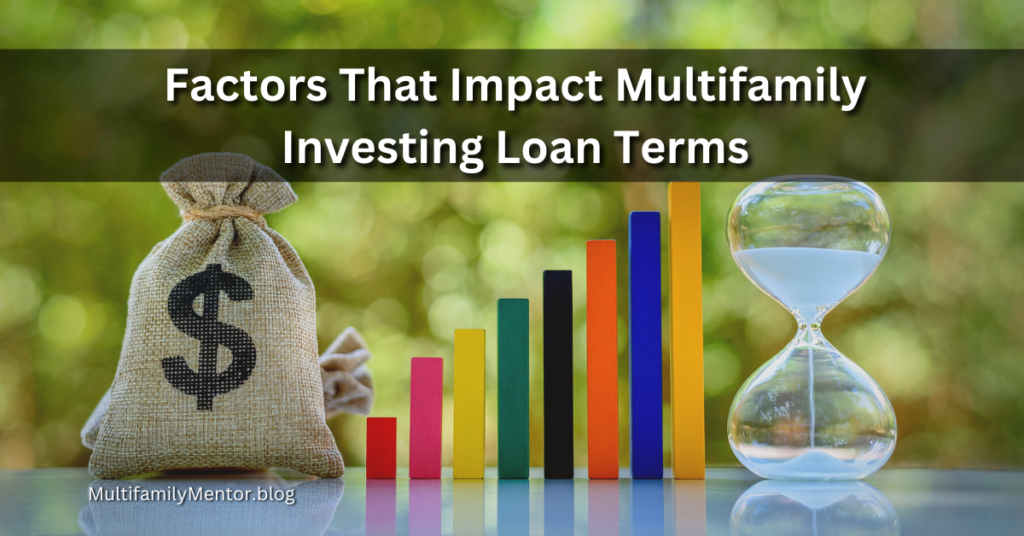Learn the top factors that impact multifamily investing loan terms and improve your chances of securing favorable financing for your investment
Executive Summary
Although investing in multifamily properties can be profitable, getting finance is essential to any real estate venture. It's crucial to understand the variables that can affect the loan conditions because they can have a big impact on how profitable your investment will be. The main variables that can affect the loan conditions for multifamily investing, such as credit scores, property kinds, loan-to-value ratios, interest rates, and more, will be covered in this article. You can increase your chances of obtaining advantageous financing conditions and making a successful multifamily investment by being aware of these aspects.
Introduction
A wise method to create passive income and amass wealth over time is to invest in multifamily residences. Financing multifamily ventures, however, can be trickier to get than finance for single-family houses. While deciding on loan conditions for multifamily homes, lenders take into account a number of different aspects. In this post, we'll look at the main variables that can affect the loan terms for multifamily investing and offer tips on how to increase your chances of getting good loan terms.
Credit Ratings
One of the most significant elements taken into account by lenders when assessing loan applications is your credit score. Generally speaking, loans with better terms—including lower interest rates and bigger loan amounts—have higher credit scores. The following are some essential details about credit ratings and loan terms for multifamily investing:
- For multifamily ventures, lenders normally want a credit score of at least 650.
- If your credit score is 700 or higher, you can be eligible for loans with better terms.
- Keeping your credit score high will help you get loans with better terms for upcoming
- multifamily projects.
Real Estate Types
Your loan conditions may also be influenced by the type of property you are investing in. Lenders assess the risk involved with various types of properties and may modify loan terms as a result. The following are some essential details concerning various property kinds and loan arrangements for multifamily investing:
- Because of their superior quality and minimal risk, Class A properties often offer the most favourable loan conditions.
- Loan-to-value ratios and interest rates for Class B and C properties may be lower.
- Because of their complexity, mixed-use properties could be harder to finance.
Ratios of Loan to Value
Loan-to-value (LTV) ratios show how much of the property's value the loan represents. LTV ratios can affect loan terms because higher LTV ratios put the lender at a higher risk. Here are some essential details about LTV percentages and multifamily loan conditions:
- LTV ratios of 75% or less are commonly required by lenders for multifamily ventures.
- Lower loan amounts and higher interest rates are possible outcomes of greater LTV ratios.
- Loan terms may be more favourable for lower LTV ratios.
Rates of Interest
On your multifamily investment's profitability, interest rates may have a big impact. A reduced monthly mortgage payment can translate into higher earnings if interest rates are lower. The following are some essential details about interest rates and financing conditions for multifamily investing:
- Interest rates can change depending on the loan length, the kind of property, and other variables. Multifamily loans often have higher interest rates than single-family loans.
- Obtaining a low interest rate can help your investment be more profitable.
- Ratio of Debt Service to Income
Debt Service Coverage Ratio
The ratio of the property's net operating income (NOI) to the debt service payments is known as the debt service coverage ratio (DSCR). In order to assess the borrower's capacity to make loan payments, lenders consider the DSCR. The following are some essential details about DSCR and loan terms for multifamily investing:
- For multifamily investments, lenders normally require a DSCR of at least 1.25.
- Greater DSCR ratios may lead to more advantageous loan terms, while
- Lower DSCR ratios may lead to higher interest rates and more onerous underwriting standards.
Conclusion
Although obtaining finance for multifamily investments might be difficult, being aware of the elements that affect loan conditions will help you make a successful investment. In this post, we looked at the key variables that can affect the loan conditions for multifamily investing, such as credit ratings, property types, loan-to-value ratios, interest rates, and debt service coverage ratios. You may increase your chances of obtaining advantageous loan conditions and accomplishing your investment goals by being aware of these aspects and attempting to elevate your position in each one.

